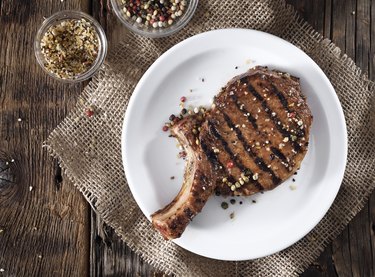
Meat is often vilified in the health and weight-loss world. When people are trying to lose weight or get healthy, meat is often the first thing to go, but there's actually a positive connection between pork and weight loss.
Pork chops are high in protein, which has been shown to help improve body composition and help with weight management. According to research, including pork chops in a healthy diet can help keep you full, lower your overall calorie intake and promote weight loss.
Video of the Day
Video of the Day
Tip
Meat, with the exception of chicken, is often the first thing to go on a weight-loss diet, but pork chops can actually help promote weight loss by keeping you full and increasing your overall metabolic rate.
Pork and Weight Loss
While chicken breasts are often considered the holy grail when it comes to weight-loss-friendly meats, pork is called the other white meat for a reason.
Like chicken, pork is high in protein — a 4-ounce serving contains 31.4 grams. According to a June 2015 report in the_ American Journal of Clinical Nutrition,_ eating around 25 to 30 grams of protein with each meal can help reduce appetite and help promote weight loss and a healthy weight management.
A July 2012 report in Nutrients adds that high-protein, meat-based diets can increase weight loss by helping you feel full and satisfied, reducing the amount of calories you consume as a well. High-protein diets can also increase metabolic rate and counteract the drop in metabolism that typically occurs as a result of weight loss.
Read more: How to Bake a Center-Cut Boneless Pork Chop
The Fat in Pork
While the benefits of protein in pork chops are clear, you may be more concerned about the potential harm of saturated fat. Although this is a common concern when it comes to meat, pork is actually higher in unsaturated fats than saturated fats.
The same 4-ounce serving of pork contains a total of 12 grams of fat. About 3.7 grams of that fat is in the form of saturated fat, while 5.8 grams comes from monounsaturated fat. If you trim the fat off and only eat the lean portion of the meat, you'll get 5.2 grams of total fat, 1.7 grams of saturated fat and 2.2 grams of monounsaturated fat, according to the USDA.
Even so, while saturated fats were vilified along with meat, especially in the 90s, newer research has brought its health effects into question. An April 2017 report in the British Journal of Sports Medicine points out that saturated fat itself doesn't clog the arteries.
The meta-analysis reviewed previous research on saturated fat and concluded that there's no solid association between eating saturated fat and heart disease, death from heart disease, stroke, Type 2 diabetes or overall death in healthy adults.
The researchers from the review also noted that the connection between saturated fat and cholesterol levels has been exaggerated and largely misunderstood.
The July 2012 Nutrients report backs up this research by stating that eating pork in place of other meats can help you lose weight without negatively affecting blood lipids, like cholesterol and triglycerides, or increasing your risk of heart disease. The researchers went even further to say that these positive effects of pork were seen in participants even without calorie restriction or increased physical activity.
That being said, it's still a good idea to stick to recommended fat intakes and only include saturated fat and pork chops as part of an otherwise healthy, whole food diet.
- American Journal of Clinical Nutrition: "The Role of Protein in Weight Loss and Maintenance"
- Nutrients: "Effects of Eating Fresh Lean Pork on Cardiometabolic Health Parameters"
- USDA FoodData Central: "Pork Chop, Broiled or Baked, Lean and Fat Eaten"
- USDA FoodData Central: "Pork Chop, Broiled or Baked, Lean Only Eaten"
- British Journal of Sports Medicine: "Saturated Fat Does Not Clog the Arteries: Coronary Heart Disease Is a Chronic Inflammatory Condition, the Risk of Which Can Be Effectively Reduced From Healthy Lifestyle Interventions"
Was this article helpful?
150 Characters Max
0/150
Thank you for sharing!
Thank you for your feedback!